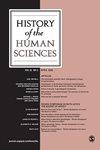Freud in Cambridge Review Symposium
IF 0.5
2区 历史学
Q2 HISTORY & PHILOSOPHY OF SCIENCE
引用次数: 0
Abstract
‘ There was a wide road to the unconscious which was neither altogether medical nor psy-chological, neither philosophical nor literary ’ (p. 614). This sentence appears towards the end of Freud in Cambridge , as John Forrester and Laura Cameron re fl ect upon the book ’ s sustained focus on a number of illustrious scientists and other intellectuals in and around Cambridge in the 1920s. Their documentation and analysis of these individuals ’ and groups ’ enthusiasm for Freud in the 1920s challenges not only received histories of the incursion of psychoanalysis into British cultural life, but also how the very history of 20th-century science is told. Our review symposium on Freud in Cambridge provides a further exempli fi cation of the wideness of the road to and out from the unconscious: we bring together an hetero-geneous and interdisciplinary group of scholars who all are in some way tied to the dis-cipline of geography, as well as enthusiastic about the epistemological and analytical challenges posed by psychoanalysis. Paul Kingsbury and Steve Pile are each central to the emergence and consolidation of a geographical sub-discipline named psychoanalytic geography (see Kingsbury and Pile, 2014; Pile, 1997). Jessica Dubow fi gures Freud as a nodal point in a network of Jewish intellectuals for whom conceptions of attachment, history, identity, and territory are radically reworked (see Dubow, 2021). Clive Barnett《剑桥评论研讨会》中的弗洛伊德
“有一条通往无意识的宽阔道路,既不是医学的,也不是心理学的,既不是哲学的,也不是文学的”(第614页)。这句话出现在《弗洛伊德在剑桥》的末尾,约翰·弗雷斯特和劳拉·卡梅伦反思了这本书对20世纪20年代剑桥及其周边一些杰出科学家和其他知识分子的持续关注。他们对20世纪20年代这些个人和群体对弗洛伊德的热情的记录和分析,不仅挑战了精神分析侵入英国文化生活的历史,也挑战了如何讲述20世纪科学的历史。我们在剑桥关于弗洛伊德的回顾研讨会提供了一个进一步的例子,说明了通往和走出无意识之路的广泛性:我们汇集了一群异质性和跨学科的学者,他们在某种程度上都与地理学科有关,同时对精神分析提出的认识论和分析挑战充满热情。保罗·金斯伯里(Paul Kingsbury)和史蒂夫·派尔(Steve Pile)都是精神分析地理学这一地理分支学科出现和巩固的核心人物(见Kingsbury and Pile, 2014;桩,1997)。Jessica Dubow认为弗洛伊德是犹太知识分子网络中的一个节点,对他们来说,依恋、历史、身份和领土的概念都被彻底地重新设计了(见Dubow, 2021)。克莱夫·巴内特
本文章由计算机程序翻译,如有差异,请以英文原文为准。
求助全文
约1分钟内获得全文
求助全文
来源期刊

History of the Human Sciences
综合性期刊-科学史与科学哲学
CiteScore
1.60
自引率
11.10%
发文量
31
审稿时长
>12 weeks
期刊介绍:
History of the Human Sciences aims to expand our understanding of the human world through a broad interdisciplinary approach. The journal will bring you critical articles from sociology, psychology, anthropology and politics, and link their interests with those of philosophy, literary criticism, art history, linguistics, psychoanalysis, aesthetics and law.
 求助内容:
求助内容: 应助结果提醒方式:
应助结果提醒方式:


